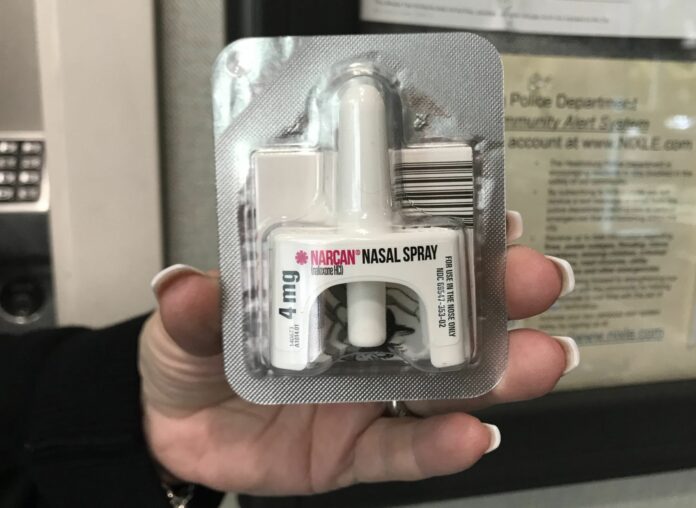
The Healdsburg Police Department will soon be the recipient of 24 Narcan kits expected to last the department two years after receiving an approximate $2,000 grant earlier this month from the state department of health services.
With opioid overdoses on the rise countywide and across the country and with a spike in Naloxone (the opioid reversing drug used in Narcan) prices, the kits are a timely addition to the department.
A CBS article reported in 2018 that the rising demand for the drug, which comes in a nasal spray known as Narcan and in an injection pack, has driven the price up by 50 percent in recent years.
According to the same article, experts say price increases stem from a surge in opioid overdoses and a lack of industry competition and federal rules that regulate the price of Naloxone. The Centers for Disease Control and Prevention says opioids were involved in 47,600 overdose deaths in 2017 and accounted for 67.8 percent of all drug overdose deaths that year and California was cited as having a statistically significant increase in drug overdose deaths from 2016 to 2017.
Leigh Purvis, director of health services research in AARP’s Public Policy Institute, told CBS MoneyWatch, “We don’t have any mechanisms to stop manufacturers from raising prices.”
And while first responders and health departments are typically offered discounts – Adapt provides Narcan at a 40 percent discount rate at $75 for two doses – Healdsburg Chief of Police Kevin Burke said the department is fortunate to get the Narcan grant.
“The state has really been proactive about getting these kits in the hands of people who need them … And they approved us rather quickly for the 24 kits, enough to last us a few years,” Burke said.
Burke first learned about the first-come, first-serve grant through the Harm Reduction Task Force, which Burke is a part of.
“It is pretty much a no questions grant available for first responders and other entities that have a need for Narcan,” he said.
The number of kits requested did not come down to a projection of how many the department expects to use (24 would provide 12 a year at one per month), rather it came down to a grant requirement to request the kits in multiples of 12.
“You can request as many as you want, but I wanted to request an amount that we would have a reasonable likelihood of using… we could use a lot or very few, it is hard to say,” Burke said.
Burke said he expects to end up with extra kits.
“24 is a lot, but we think it is better to have too many,” he said.
Since Healdsburg officers first started carrying nasal spray kits in May, there were two cases within a month of each other where Narcan were used.
The first overdose case happened on Oct. 21 when a 35-year-old man was found unconscious in the bathroom of the Vine Street Safeway in Healdsburg. Responding officers were able to administer CPR and the drug, which works by blocking receptors in the brain, and were able to revive the man.
The second case occurred on Center Street on Nov. 13 in the CVS pharmacy bathroom. Officers were able to revive an unconscious man with two doses of the nasal spray.
In both cases the victims were suspected of experiencing a narcotics overdose.
David Anderson, a Healdsburg local and a former chief of medical staff at the Healdsburg District Hospital who advocated for the use of Narcan, said of the grant, “I am very pleased they’ll have 24 Narcan kits. They have only used two in the last six months so 24 should last longer than two years, but note that fentanyl is becoming more prevalent so it could be that we will see more and more of these emergencies in the next several years.”
According to Healdsburg City Manager David Mickaelian, the kits should arrive in a few weeks.







